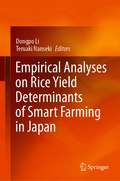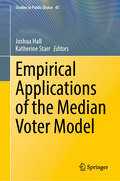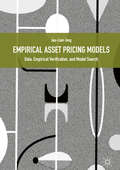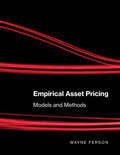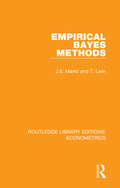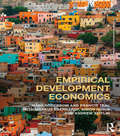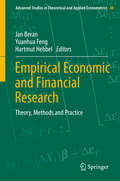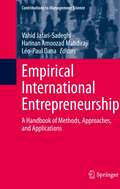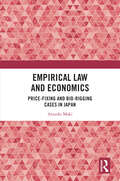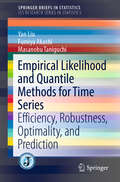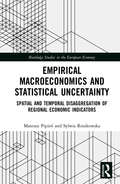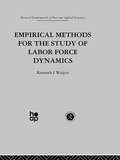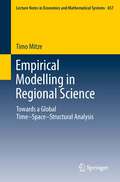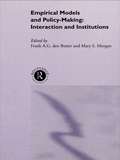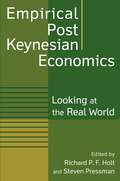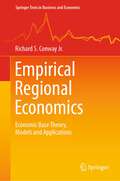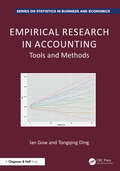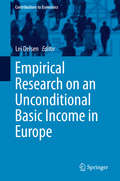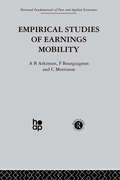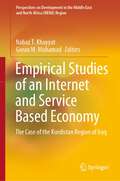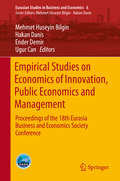- Table View
- List View
Empire’s Labor: The Global Army That Supports U.S. Wars
by Adam MooreIn a dramatic unveiling of the little-known world of contracted military logistics, Adam Moore examines the lives of the global army of laborers who support US overseas wars. Empire's Labor brings us the experience of the hundreds of thousands of men and women who perform jobs such as truck drivers and administrative assistants at bases located in warzones in the Middle East and Africa. He highlights the changes the US military has undergone since the Vietnam War, when the ratio of contractors to uniformed personnel was roughly 1:6. In Afghanistan it has been as high as 4:1. This growth in logistics contracting represents a fundamental change in how the US fights wars, with the military now dependent on a huge pool of contractors recruited from around the world. It also, Moore demonstrates, has social, economic, and political implications that extend well beyond the battlefields.Focusing on workers from the Philippines and Bosnia, two major sources of "third country national" (TCN) military labor, Moore explains the rise of large-scale logistics outsourcing since the end of the Cold War; describes the networks, infrastructures, and practices that span the spaces through which people, information, and goods circulate; and reveals the experiences of foreign workers, from the hidden dynamics of labor activism on bases, to the economic and social impacts these jobs have on their families and the communities they hail from. Through his extensive fieldwork and interviews, Moore gives voice to the agency and aspirations of the many thousands of foreigners who labor for the US military.Thanks to generous funding from UCLA and its participation in TOME (Toward an Open Monograph Ecosystem), the ebook editions of this book are available as Open Access volumes from Cornell Open (cornellopen.org) and other repositories.
Empirical Analyses on Rice Yield Determinants of Smart Farming in Japan
by Dongpo Li Teruaki NansekiThis book consists of the major findings of the series projects on smart rice farming in Japan, headed by President of the Society of Agricultural Informatics. It is the gateway to know the paddy agriculture, by incorporating the findings of series national projects. The scenario includes soil analysis, growth investigation, environmental observation of air temperature, water temperature, water depth, cultivation and management records, yield, and quality analysis. In addition to the analysis of this large database, it showcases the new generation large-scale rice farming technology system, integrated with agri-machineries, field sensors, visualized farming, and skill-transferring system. This book presents an analytical framework of big data in agriculture and shows the empirical results for rice farm innovation. The authors want to have the pleasure to contribute the agricultural innovations of adopting smart technologies and empirical studies, in countries no matter far or near to Japan. The authors also hope this book conveys the innovative and elaborate sprites of smart agriculture to the next generation and is of interest to students with curiosity on agriculture, smart technology, and empirical study.
Empirical Applications of the Median Voter Model (Studies in Public Choice #45)
by Joshua Hall Katherine StarrThis book contains eight empirical applications of the median voter model. There exists a large literature in economics explaining public policy outcomes using the median voter model. The papers in this volume contribute to our understanding of how the institutional context of voting matters for collective decision-making. The authors of this volume apply the median voter model in a variety of different contexts, from testing the interest group orientation of government spending to voting by members of the National Collegiate Athletic Association. Chapters also focus on the political economy of: state-level psychedelic drug legalization, bank entry restrictions, public pension reform, state renewable portfolio standards, automobile insurance regulation, and profits in the dialysis market.
Empirical Asset Pricing Models: Data, Empirical Verification, And Model Search
by Jau-Lian JengThis book analyzes the verification of empirical asset pricing models when returns of securities are projected onto a set of presumed (or observed) factors. Particular emphasis is placed on the verification of essential factors and features for asset returns through model search approaches, in which non-diversifiability and statistical inferences are considered. The discussion reemphasizes the necessity of maintaining a dichotomy between the nondiversifiable pricing kernels and the individual components of stock returns when empirical asset pricing models are of interest. In particular, the model search approach (with this dichotomy emphasized) for empirical model selection of asset pricing is applied to discover the pricing kernels of asset returns.
Empirical Asset Pricing: Models and Methods (The\mit Press Ser.)
by Wayne FersonAn introduction to the theory and methods of empirical asset pricing, integrating classical foundations with recent developments.This book offers a comprehensive advanced introduction to asset pricing, the study of models for the prices and returns of various securities. The focus is empirical, emphasizing how the models relate to the data. The book offers a uniquely integrated treatment, combining classical foundations with more recent developments in the literature and relating some of the material to applications in investment management. It covers the theory of empirical asset pricing, the main empirical methods, and a range of applied topics.The book introduces the theory of empirical asset pricing through three main paradigms: mean variance analysis, stochastic discount factors, and beta pricing models. It describes empirical methods, beginning with the generalized method of moments (GMM) and viewing other methods as special cases of GMM; offers a comprehensive review of fund performance evaluation; and presents selected applied topics, including a substantial chapter on predictability in asset markets that covers predicting the level of returns, volatility and higher moments, and predicting cross-sectional differences in returns. Other chapters cover production-based asset pricing, long-run risk models, the Campbell-Shiller approximation, the debate on covariance versus characteristics, and the relation of volatility to the cross-section of stock returns. An extensive reference section captures the current state of the field. The book is intended for use by graduate students in finance and economics; it can also serve as a reference for professionals.
Empirical Bayes Methods (Routledge Library Editions: Econometrics #12)
by J. S. Maritz T. LwinOriginally published in 1970; with a second edition in 1989. Empirical Bayes methods use some of the apparatus of the pure Bayes approach, but an actual prior distribution is assumed to generate the data sequence. It can be estimated thus producing empirical Bayes estimates or decision rules. In this second edition, details are provided of the derivation and the performance of empirical Bayes rules for a variety of special models. Attention is given to the problem of assessing the goodness of an empirical Bayes estimator for a given set of prior data. Chapters also focus on alternatives to the empirical Bayes approach and actual applications of empirical Bayes methods.
Empirical Development Economics (Routledge Advanced Texts in Economics and Finance)
by Simon Quinn Måns Söderbom Francis Teal Markus Eberhardt Andrew ZeitlinUnderstanding why so many people across the world are so poor is one of the central intellectual challenges of our time. This book provides the tools and data that will enable students, researchers and professionals to address that issue. Empirical Development Economics has been designed as a hands-on teaching tool to investigate the causes of poverty. The book begins by introducing the quantitative approach to development economics. Each section uses data to illustrate key policy issues. Part One focuses on the basics of understanding the role of education, technology and institutions in determining why incomes differ so much across individuals and countries. In Part Two, the focus is on techniques to address a number of topics in development, including how firms invest, how households decide how much to spend on their children’s education, whether microcredit helps the poor, whether food aid works, who gets private schooling and whether property rights enhance investment. A distinctive feature of the book is its presentation of a range of approaches to studying development questions. Development economics has undergone a major change in focus over the last decade with the rise of experimental methods to address development issues; this book shows how these methods relate to more traditional ones. Please visit the book's website at www.empiricalde.com for online supplements including Stata files and solutions to the exercises.
Empirical Economic and Financial Research
by Jan Beran Yuanhua Feng Hartmut HebbelThe purpose of this book is to establish a connection between the traditional field of empirical economic research and the emerging area of empirical financial research and to build a bridge between theoretical developments in these areas and their application in practice. Accordingly, it covers broad topics in the theory and application of both empirical economic and financial research, including analysis of time series and the business cycle; different forecasting methods; new models for volatility, correlation and of high-frequency financial data and new approaches to panel regression, as well as a number of case studies. Most of the contributions reflect the state-of-art on the respective subject. The book offers a valuable reference work for researchers, university instructors, practitioners, government officials and graduate and post-graduate students, as well as an important resource for advanced seminars in empirical economic and financial research.
Empirical Evidence on the Effects of Tax Incentives
by Alexander Klemm Stefan Van ParysA report from the International Monetary Fund.
Empirical Fiscal Federalism (Elements in Public Economics)
by Federico Revelli Emanuele BraccoFiscal federalism has long been an important topic of inquiry in applied public economics, and interest in the functioning of intergovernmental fiscal relationships in multi-tiered public sector structures does not seem to be fading. Rather, the recent economic downturn and sovereign debt crisis have brought the analysis of multi-level fiscal governance to the forefront of academic discourse and stimulated the search for tax assignments that ease coordination between authorities at different tiers while preserving local fiscal autonomy and minimizing the harmful effects of taxation on the prospects of economic recovery. This Element examines the recent empirical work in this area and discusses the most critical issues that future research will need to address in order to push further the frontier of econometric analysis in fiscal federalism.
Empirical International Entrepreneurship: A Handbook of Methods, Approaches, and Applications (Contributions to Management Science)
by Léo-Paul Dana Vahid Jafari-Sadeghi Hannan Amoozad MahdirajiThis handbook is focused on the analytical dimension in researching international entrepreneurship. It offers a diverse collection of chapters focused on qualitative and quantitative methods that are being practised and can be used by future researchers in the field of international entrepreneurship. The qualitative cluster covers articles, conceptual and empirical chapters as well as literature reviews, whereas the quantitative cluster analyses international entrepreneurship through a broad range of statistical methods such as regressions, panel data, structural equation modelling as well as decision-making and optimisation models in certain and uncertain circumstances. This book is essential reading for researchers, scholars and practitioners who want to learn and implement new methods in analysing entrepreneurial opportunities across national borders.
Empirical Law and Economics: Price-Fixing and Bid-Rigging Cases in Japan
by Atsushi MakiMaki provides an empirical analysis of law and economics by reevaluating Myrdal's value premises and Weber's separation of analysis and policy.In modern civil society, individuals and businesses conduct economic activities through markets. The mainstream economic theory is the general equilibrium theory, which assumes a perfectly competitive market. The upshot is that transactions through competitive markets maximize the economic welfare of society, with policies such as deregulation and privatization being implemented with the backing of the law. However, in the real economy, legal transactions do not always take place, and this book analyzes price-fixing and bid-rigging cases. These cases show that there is a gap between competition philosophy and legislation. Using the real economy as data, this book conducts an empirical analysis of law and economics and illustrates issues related to the ideals of economics and the proper application of law. Accumulating empirical results will provide the means to form a healthy civil society.A useful reference for graduate students and researchers in economics and legal research, and an interesting read for those who consider economics to be an empirical science.
Empirical Likelihood and Quantile Methods for Time Series: Efficiency, Robustness, Optimality, and Prediction (SpringerBriefs in Statistics)
by Yan Liu Masanobu Taniguchi Fumiya AkashiThis book integrates the fundamentals of asymptotic theory of statistical inference for time series under nonstandard settings, e.g., infinite variance processes, not only from the point of view of efficiency but also from that of robustness and optimality by minimizing prediction error. This is the first book to consider the generalized empirical likelihood applied to time series models in frequency domain and also the estimation motivated by minimizing quantile prediction error without assumption of true model. It provides the reader with a new horizon for understanding the prediction problem that occurs in time series modeling and a contemporary approach of hypothesis testing by the generalized empirical likelihood method. Nonparametric aspects of the methods proposed in this book also satisfactorily address economic and financial problems without imposing redundantly strong restrictions on the model, which has been true until now. Dealing with infinite variance processes makes analysis of economic and financial data more accurate under the existing results from the demonstrative research. The scope of applications, however, is expected to apply to much broader academic fields. The methods are also sufficiently flexible in that they represent an advanced and unified development of prediction form including multiple-point extrapolation, interpolation, and other incomplete past forecastings. Consequently, they lead readers to a good combination of efficient and robust estimate and test, and discriminate pivotal quantities contained in realistic time series models.
Empirical Macroeconomics and Statistical Uncertainty: Spatial and Temporal Disaggregation of Regional Economic Indicators (Routledge Studies in the European Economy)
by Mateusz Pipień Sylwia RoszkowskaThis book addresses one of the most important research activities in empirical macroeconomics. It provides a course of advanced but intuitive methods and tools enabling the spatial and temporal disaggregation of basic macroeconomic variables and the assessment of the statistical uncertainty of the outcomes of disaggregation. The empirical analysis focuses mainly on GDP and its growth in the context of Poland. However, all of the methods discussed can be easily applied to other countries. The approach used in the book views spatial and temporal disaggregation as a special case of the estimation of missing observations (a topic on missing data analysis). The book presents an econometric course of models of Seemingly Unrelated Regression Equations (SURE). The main advantage of using the SURE specification is to tackle the presented research problem so that it allows for the heterogeneity of the parameters describing relations between macroeconomic indicators. The book contains model specification, as well as descriptions of stochastic assumptions and resulting procedures of estimation and testing. The method also addresses uncertainty in the estimates produced. All of the necessary tests and assumptions are presented in detail. The results are designed to serve as a source of invaluable information making regional analyses more convenient and – more importantly – comparable. It will create a solid basis for making conclusions and recommendations concerning regional economic policy in Poland, particularly regarding the assessment of the economic situation. This is essential reading for academics, researchers, and economists with regional analysis as their field of expertise, as well as central bankers and policymakers.
Empirical Methods for the Study of Labour Force Dynamics
by Kenneth WolpinIn the last twenty years there has been an explosion of economic research on labor force dynamics; the movement of individuals between labor force states. This book focuses on the methods by which behavioral theories of labor force dynamics have been empirically implemented. Most attention is paid to the partial equilibrium two-state transitional model of job search behavior. That model is the foundation for much of our thinking about the nature of unemployment at both the individual and aggregate levels. Although the basic formulation has remained the same, approaches to the empirical implementation of such models has changed dramatically.
Empirical Modelling in Regional Science
by Timo MitzeEconomic agents interact in structural relationships through time and space. This work starts from the empirical observation that all three dimensions, namely time, space, and structural functional forms, are important for an integrative framework of modern empirical analysis in regional science. The work thus aims at combining up-to-date econometric tools from the fields of spatial econometrics, panel time-series analysis and structural simultaneous equation modelling to analysis the different research questions at hand. Most of the topics dealt within this work start from a concrete empirical problem, while problem solving also aims at generating some new knowledge in a methodological way, e.g. by the complementary use of Monte Carlo simulation studies to compare the empirical performance of different estimators for specific data samples. Following a first introductory chapter, the work is structured in three parts addressing major issues in building up a stylized regional economic model such as interregional migration, factor and final demand estimation. All empirical applications use German regional data.
Empirical Models and Policy Making: Interaction and Institutions
by Mary S. Morgan Frank A. G. den ButterThis collection, written by highly-placed practitioners and academic economists, provides a picture of how economic modellers and policy makers interact. The book provides international case studies of particular interactions between models and policy making, and argues that the flow of information is two-way.
Empirical Post Keynesian Economics: Looking at the Real World
by Steven Pressman Richard P HoltThis text highlights the major empirical questions and issues facing Post Keynesian economics today. Featuring contributions by leading Post Keynesian economists, it focuses on public policy and real-life analysis of this vibrant and dynamic economic theory. In language that is accessible to upper-level undergraduate and graduate students, professional economists, and public policy makers, each of the chapters takes on a specific issue of concern to all professional economists, provides empirical analysis of the issue, and then discusses the Post Keynesian view on the topic and contrasts it with the orthodox perspective. The topics covered are grouped into three main categories: empirical studies of consumption; empirical studies of business investment; and empirical studies of international economic relations.
Empirical Regional Economics: Economic Base Theory, Models and Applications (Springer Texts in Business and Economics)
by Richard S. Conway Jr.This textbook offers an introduction to empirical regional economics, including a comprehensive and systematic overview of the fundamentals, history, development, and applications of economic base models. It not only provides a sound basis for regional economics and regional economic analysis, but it also includes numerous applications of the underlying theory. The book has an empirical orientation, highlighting the value of observation and testing in order to explain regional economic behavior. Theory plays an important role in this study, but it is only a starting point. The book is divided into three parts: the first discusses the economic base theory of regional growth and the empirical evidence supporting it, while the second part covers the specification and application of four increasingly complex regional economic models: the economic base model, the input-output model, the interindustry econometric model, and the structural time-series model. Lastly, the third part presents forty-eight regional economic case studies organized under seven headings, including economic cycles, economic policy, and regional forecasting. Given its scope, the book appeals to upper-undergraduate and graduate students majoring in economics, economic geography, and business, as well as to anyone in the private or public sector interested in gaining a better understanding of practical methods of regional economic forecasting and analysis.
Empirical Research in Accounting: Tools and Methods (Chapman and Hall/CRC Series on Statistics in Business and Economics)
by Ian D. Gow Tongqing DingThis textbook provides the foundation for a course that takes PhD students in empirical accounting research from the very basics of statistics, data analysis, and causal inference up to the point at which they conduct their own research. Starting with foundations in statistics, econometrics, causal inference, and institutional knowledge of accounting and finance, the book moves on to an in-depth coverage of the core papers in capital market research. The latter half of the book examines contemporary approaches to research design and empirical analysis, including natural experiments, instrumental variables, fixed effects, difference-in-differences, regression discontinuity design, propensity-score matching, and machine learning. Readers of the book will develop deep data analysis skills using modern tools. Extensive replication and simulation analysis is included throughout.Key Features: Extensive coverage of empirical accounting research over more than 50 years. Integrated coverage of statistics and econometrics, institutional knowledge, and research design. Numerous replications and a dozen simulation analyses to immerse readers in papers and empirical analysis. All tables and figures in the book can be reproduced by readers using included code. Easy-to-use templates facilitate hands-on exercises and introduce reproduceable research concepts. (Solutions available to instructors.)
Empirical Research on Environmental Policies in China: China Towards Decarbonization and Recycle Economy
by Kiyoshi FujikawaThis book presents an empirical study of the effects of environmental policies on China and its neighboring countries, with a focus on waste and climate policies in China. The two major carbon policies have to do with carbon markets and renewable energy. The authors first examine the effectiveness of the Asian carbon market. Because of the consumption of goods beyond provincial borders, nationwide carbon markets are rather difficult to operate; therefore, a desirable initial allocation in the carbon market is proposed in this book. As for renewable power, its sources have not been fully utilized owing to a regional mismatch of supply and demand, so optimal locations of renewable energy are shown. The book also contains an analysis of the environmental and economic impacts of changes in resource circulation in East Asia. Although motorization is advancing rapidly, the vein industry for recycling used cars has not progressed. The authors estimate the amount of materials from used cars including new energy vehicles (electric and fuel cell vehicles) and propose desirable policies for used vehicles. East Asia is interdependent with respect to carbon and waste as well as the economy. China has regulated the import of waste recently and has started recycling its own wastes, putting pressure on neigboring countries to recycle their waste domestically. The authors estimate the environmental and economic impacts of such policy changes.
Empirical Research on an Unconditional Basic Income in Europe (Contributions to Economics)
by Lei DelsenThe unconditional basic income (UBI) has attracted renewed attention in academia, as well as in public discussions in recent years, and much has been written on the possible consequences of a UBI. However, this is the first book focusing on the UBI in Europe that offers empirical research findings. It includes a survey on preferences for a UBI in the EU; an assessment of the political feasibility of a UBI in the EU; field studies in the Netherlands and Scotland; and the findings of laboratory experiments. Presenting contributions from Dutch and international researchers, this book provides scientific answers to the question of whether a UBI is desirable and feasible in Europe.
Empirical Studies of Earnings Mobility
by A. Atkinson Bourguinon C. MorrisDo individuals keep the same place on the earnings scale, or is there a great deal of mobility? This volume discusses the empirical studies of this issue.
Empirical Studies of an Internet and Service Based Economy: The Case of the Kurdistan Region of Iraq (Perspectives on Development in the Middle East and North Africa (MENA) Region)
by Nabaz T. Khayyat Goran M. MuhamadThis book is a collection of eight studies covering several areas pertinent to the current technological and banking services situation in the Kurdistan region of Iraq. The economy of the Kurdistan Region of Iraq (KRI) is mainly dependent on oil revenue. The oil export revenue constitutes more than 90% of the government’s fiscal revenue. In addition to that, the public sector plays an excessive role in the economy, with public spending to GDP being over 70% while revenue from taxation constitutes less than 30% of total revenue. As the economy is not diversified, there is a large gap between demand and supply of locally produced tradeable goods, leaving the KRI economy highly dependent on imports. Another structural challenge of the KRI economy is its dependence on cash and a weekly financial system. Although the region has witnessed extraordinary economic growth from 2008 to 2014, the growth rate decreased from 8 to 1 percent, trade and investment dropped to 5 percent, and the unemployment rate significantly increased to over 20% by the end of the year 2019. To maintain the progress of economic development, it is necessary to upgrade the country’s industrial structure in order to be able to generate more value-added products, which requires advancement in technological infrastructure to employ more sophisticated technologies. There is not much written about Kurdistan and its economy, and yet there is a comprehensive development plan and resources to be used for education, research, rehabilitation, development, and reconstruction. As such, this book would be of interest to researchers, decision-makers, governmental and non-governmental organizations, undergraduate and graduate students, and the general public with an interest in the Middle East and contemporary Kurdish issues. It is a good up-to-date handbook for policymakers and NGOs involved in the rehabilitation, reconstruction, and development of Iraq.
Empirical Studies on Economics of Innovation, Public Economics and Management
by Mehmet Huseyin Bilgin Hakan Danis Ender Demir Ugur CanThis volume presents selected papers from the 18th Eurasia Business and Economics Society (EBES) Conference, with major emphasis placed on highlighting the latest research developments in the economics of innovation, public economics, and management. The articles in the volume also address more specialized topics such as luxury fashion, weather derivatives, health management, islamic bonds, and life satisfaction, among others. The majority of the articles focus on phenomena observed in the Middle East and North Africa (MENA) region and South Asia, representing a unique contribution to understanding contemporary research challenges from a different perspective.

